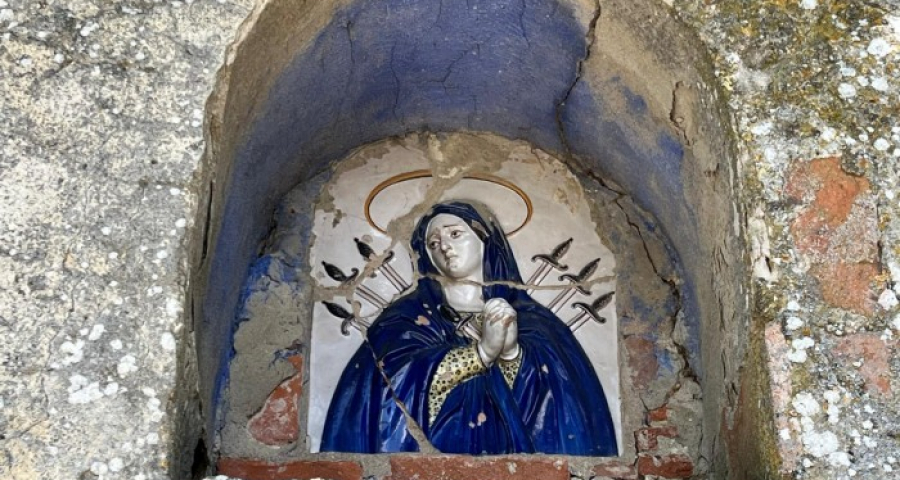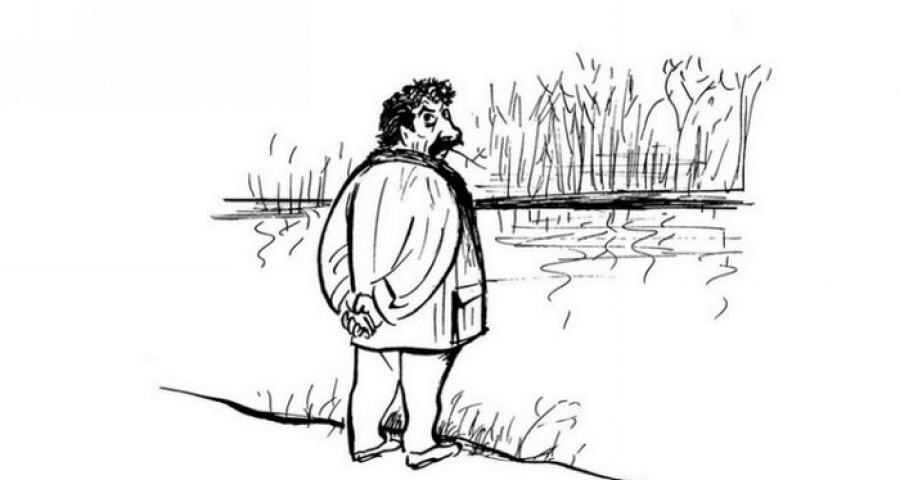Narrative Economics/6 - In “Christ Stopped at Eboli,” a journey into peasant misery that reflects on the authentic aspiration of the human
by Luigino Bruni
published in Avvenire on 17/11/2024
"People will say to me: I do not conclude. I answer: Intelligence does not conclude anything: it sees. If it sees."
Don Giuseppe De Luca, Intorno al Manzoni
Democracy is a destruction of gifts-obligations to create conditions for gifts-gratuities. Those that are not there in Levi's Christ.
Writers, especially the older ones, first see their characters, scenes, landscapes, dialogues, blanks, then write them. One cannot narrate if one does not see first. In this, too, the writer resembles the biblical prophet, who, before hearing the word, sees it: "Word that Isaiah saw" (Isaiah 2:1), "Word that Amos saw" (Am 1:1). "And Christmas Eve came... The peasants and women went around, bringing presents to the houses of the lords; here it is an ancient custom for the poor to pay homage to the rich, and bring gifts, which are received as a thing due, with sufficiency, and not reciprocated" (Cristo si è fermato a Eboli, p. 181).
Here Carlo Levi shows us a practice of gift-giving that differs from the theories of gift-giving that had been elaborated a few decades earlier by anthropologist Marcel Mauss and his colleagues. While those scholars explained to us that the gift circuit has a ternary structure made up of giving-accepting-contracepting, Levi told us instead about a gift that was only obligation: munus, the Romans said, or gift, which derives from re (rex, regis), and that is, the obligatory offerings to kings, to lords, to superiors, to divinity. In the society of peasant Italy described by Levi, the gifts-gifts of the poor knew no reciprocity: they had to be made to the lords, and that was it. Giving-accepting-reciprocating was reduced to just giving; it is true that sometimes the lords did not accept the gifts, but not so that they would not be obliged to reciprocate to the poor (this obligation was never there); if they did not accept it was only because they were not adequate and welcome: and this was indeed a misfortune. That of the peasants was a one-sided, no-return obligation. The pre-modern world did not know what gift-gratuity was: it knew only gifts, obligations, but free gift was not among the tools of man and even less of the ancient woman. Levi felt he had to violate that ancient liturgy, which, as a modern, liberal man, he saw only as a feudal legacy: "Even I had to receive, that day, bottles of oil, of wine, and eggs, and canestrelli of dried figs, and the donors were amazed that I did not accept them as an obligatory tithe, but that I shunned them, and made, in return, as I could, some gift. What a strange gentleman was I then, if the traditional inversion of the fable of the Magi did not apply to me, and one could enter my house empty-handed?" (pp. 181-182). Nice is the reference 'to the inversion' of the tradition ('fable') of the Magi: those lords of Matthew's gospel brought gifts to a poor mother and child, while the Christian lords of Gagliano the gifts-gifts demanded them from the poor and women. My grandmothers, my mother, my father did not know gifts. They had, sometimes, some dried fruit at Christmas and Epiphany, but gifts as we understand them (free and free) were almost never there, for birthdays or otherwise. Gifts were (almost) always experienced as fate without the experience of freedom. There were instead offerings needed for saints, for masses, regalia from the powerful at special times to strengthen hierarchies.
These ancient practices of gift-without-gratuity were intertwined with a religious idea of sacrifice, which grew during the Catholic Counter-Reformation: peasants, women, the poor had to sacrifice themselves for the family, for the church, for God, but on the other side there was no one to sacrifice for them. Even the sacrifice to God was experienced as a gift, as an offering to be made to the most powerful of the powerful, gifts that did not liberate the poor and bound them tighter to their sad fate. Although, we know, human beings are greater than their fate, and from the worlds of only-obligation, gifts have also always flourished -- and continue to flourish.
The path of democracy has been a gift-creating destruction so that we can start giving gifts, because gift is the other name for freedom, not the register of servants and slaves. And whenever gift-giving-obligations return in our social and religious relations, we are retrogressing to the feudal world.
These gifts without gratuity are also present in the figure of Don Trajella, the parish priest of Gagliano. Don Giuseppe Trajella from Tricarico is a 'won' in the Christ cycle. Carlo Levi's first meeting with the archpriest composes one of the novel's most beautiful watercolors: "He was a small, skinny old man, with iron-rimmed spectacles on a sharp nose.... From his whole appearance exhaled a weary air of ill- endured misery; like the ruins of a burned-out hovel, black and full of weeds." As a young man he had been professor of theology at the seminary in Naples and the seminary in Melfi, a writer, author of biographies of saints, sculptor and painter. He had been sent to Gagliano "as a punishment," and was disliked in the village, where it was said "he was always drunk." By now he was "but a poor persecuted and embittered priest, a black and sick sheep in a flock of wolves." Misfortune "had struck him, detached him from everything, and tossed him, like a wreck, on that distant inhospitable beach. He had let himself fall to the bottom, bitterly enjoying making his own misery greater. He had never again touched a book or a brush... Trajella hated the world, because the world haunted him" (pp. 42-43). Levi also has eyes of pity for this hapless old priest: he sees him in his misfortune, looks at him, in his own way redeems him and saves him with his good eyes. Another fellow sufferer of misfortune, of a different and similar confinement, another defeated by life and that unhappy time. And Levi knows how to be well in this uncomfortable company, in the 'court of miracles' of his Christ, of which Charles is not the king but simply one of them.
Don Trajella is the protagonist of the hilarious Christmas Eve Mass of 1935. The faithful were in the church, but "there was no sign of Don Trajella." After half an hour of waiting, Don Luigino, the leader of the local fascists, thought the priest was drunk again: he sent a boy to look for him and the parish priest finally arrived. At the end of the mass, after the ite missa est, Don Trajella went up to the pulpit to proclaim his sermon and, after a few minutes of half-words and apologies, he finally spoke: "Dearest brothers... I had prepared a sermon that was really, may I say it with all humility, beautiful: I had written it down, to read it, because I don't have much memory. I had put it in my pocket. And now, alas, I cannot find it, I have lost it; and I cannot remember anything. How to do?" (p. 183). Don Luigino does not believe him, and does not hold back his ire: "It is a scandal, it is a desecration of the house of God. Fascists, to me." But as the priest lies, prostrate, on his knees, something extraordinary happens: "Miracle, miracle! Jesus heard me! ... I had lost my sermon, and he made me find something better." Under the wooden crucifix popped up a paper with a letter printed on it from a sergeant from Gagliano, from the Abyssinian War. And that letter became his new sermon on war and peace, emphasizing that "this war is not a war, but an action of peace." Meanwhile, while Don Trajella was preaching, Don Luigino and his fascists had begun to sing "Faccetta nera" and then "Giovinezza" in the church. But Trajella, indifferent to the disturbance, resolutely continued his sermon, set aside the sergeant's letter and thus concluded, "The divine infant was born at this very hour to bring this word of peace. Pax in terra hominibus... But you are wicked, you are sinners, you never come to church, you don't do devotions, you sing ditties, you blaspheme, you don't baptize your children, you don't go to confession, you don't take communion... And therefore peace is not with you. Pax in terra hominibus: you do not know Latin. What does Pax in terra hominibus mean? It means that today, on Christmas Eve, you should have brought a kid as a gift, according to custom, to your pastor. Instead, you did not. For you are unbelievers; and because you are not bonae voluntatis, you do not have a good will, so you do not have peace, and the blessing of the Lord. So think about it, bring your pastor the kid, pay the debts for his land that you owe him from the past year, if you want God to look upon you with mercy, keep his hand on your head, inspire peace in your hearts, if you want peace to return to the world and end the war" (p. 183). A different 'lamb' that will bring another peace; other 'debts' forgiven by other debtors.
Don Luigino, that very night denounced Don Trajella to the podesta, and was soon transferred. During that same night, Giulia, his maid, revealed to Carlo the most powerful spells, "those that can make people sick and die - Only on Christmas can they be said, in the greatest secrecy, and with an oath not to repeat them to anyone else... On all other days it is a mortal sin" (p. 187). I, too, well remember Pierina, an elderly lady in my village, a family friend, who only on Christmas night could reveal the secret formulas to remove envy (through a ritual with oil); I never learned them, I was too young for an oath, but that magical-religious world enchanted me, and left me with a sense of the mystery that flows within life as a gift.
The economy, the misery and exploitation of the peasants, are Christ's horizon, sometimes its content: "The peasants were paid starvation wages. I remembered, on the day of my arrival, in the midst of the harvest, the long lines of women, going up with sacks of grain on their heads, like the damned of hell, under the fierce sun.... The best and most humane thinker of this land, Giustino Fortunato, liked to call himself 'the politician of nothing.' I used to think how many times every day, I used to hear this continuous word, in all the peasants' speeches. - Ninte - as they say in Gagliano: 'What did you eat?' - Nothing -. 'What are you hoping for?' - Nothing - 'What can be done? - Nothing - And the eyes rise, in the gesture of denial, to the sky" (p. 169). Another nihilism, different from that of the philosophers. Free and public schools, universal health care, jobs for all, support teachers, were and are the tools and places where we have tried to overcome that 'nothing'. Today other 'nothing' is occupying the souls and hearts of our people, of too many young people. A nothing of peace, of hope, of community, of relationships, of encounters, of God.













